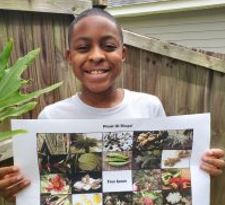
by Marcus Boston Jr. | Jul 31, 2020
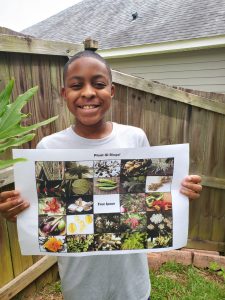
4-H Virtual Plant Science Camp Bingo Game
July 6th of this year was supposed to be the first day of our 4-H Wildlife and Outdoor Recreation Day Camp with Leon and Jefferson Counties participating. Due to the pandemic, all of our Florida 4-H face to face camps were cancelled this summer due to safety concerns for the students and the instructors.
In spite of everything that has taken place since March of this year, there is still some good news! Even though we are in the middle of a pandemic, there is an outdoor classroom in YOUR backyard that has plenty of room for young people and parents to explore. While most youth have spent more time than they probably want to with their families confined, within the four walls of their home, there is no time like the present to explore wildlife and gardening opportunities that await just outside the door. Youth that spend time outside exploring the great outdoors have the unique opportunity to stimulate their senses while engaging in “hands on” educational activities without even knowing it.
4-H provides countless opportunities for youth to gain a better understanding of how all organisms are interrelated and how they can become environmental stewards at home, school, and in the communities in which they live. What are some of the benefits of converting backyards to outdoor classrooms?
I’m glad you asked…here are just a few!
1. Healthy lifestyles are encouraged –
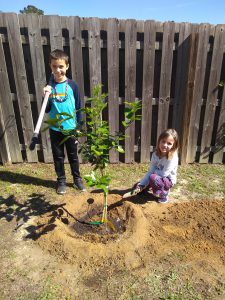
Youth planting an orange tree after participating in Virtual Plant Science Camp
Active time spent outside may help address some of the health issues we are seeing in children today such as obesity, attention deficit disorders, and depression.
2. Nature deficit disorder decline –
Exposing students to nature and allowing them to learn and play outside has shown to foster sensitivity, appreciation, and respect for the environment. It combats “nature deficit disorder” …and it can be a lot of FUN!
3. Critical-thinking skills enhanced –
Exploring what is in the backyard and starting a garden provides opportunities for experiential learning outside of the classroom and enables students to make connections that can be applied to the real world.
4. Responsible action is taken to better the environment –
By exploring outdoors either by planting or just observing nature, youth begin to understand how their decisions and actions affect the environment. It is from this point they can begin to obtain the skills necessary to address complex environmental issues as well as ways we can take action to keep our environment healthy and sustainable for the future.
So even though we are in the midst of a pandemic, there may be opportunities to make lemonade out of the COVID-19 lemons we find ourselves in by unmasking the opportunities that await in our backyards!
For more information about 4-H in your county, find your local UF/IFAS Extension office or visit http://florida4h.org.
*“Please note some pictures were taken prior to our challenges with Covid-19 and we remind people to social distance and wear a mask for the personal safety of self and others.”
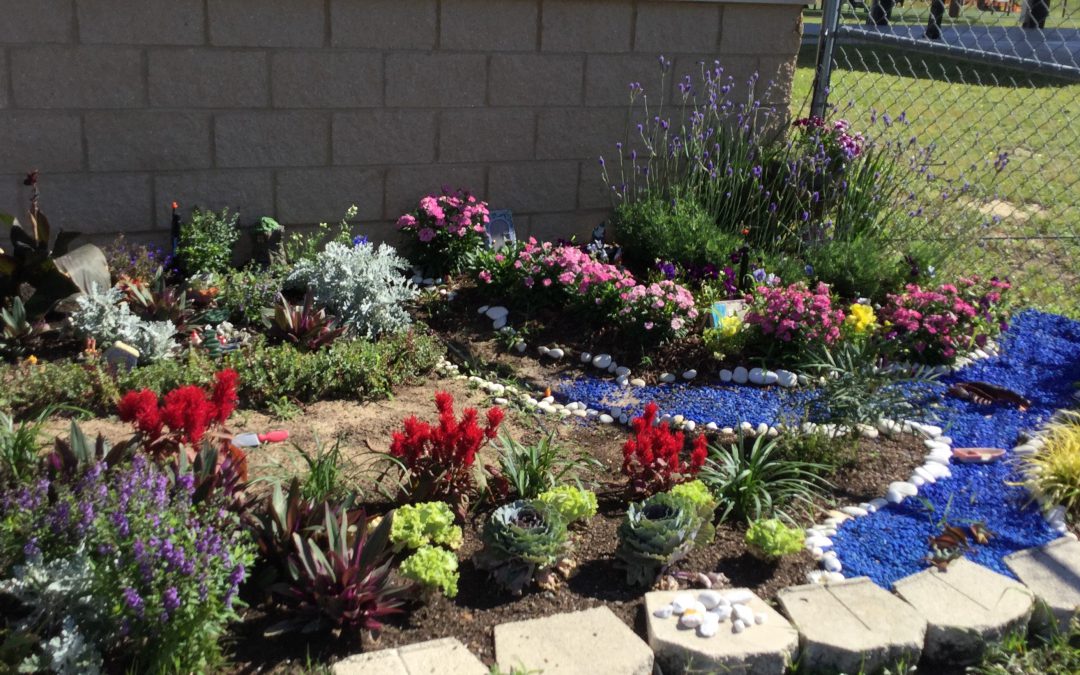
by pmdavis | Jul 5, 2019
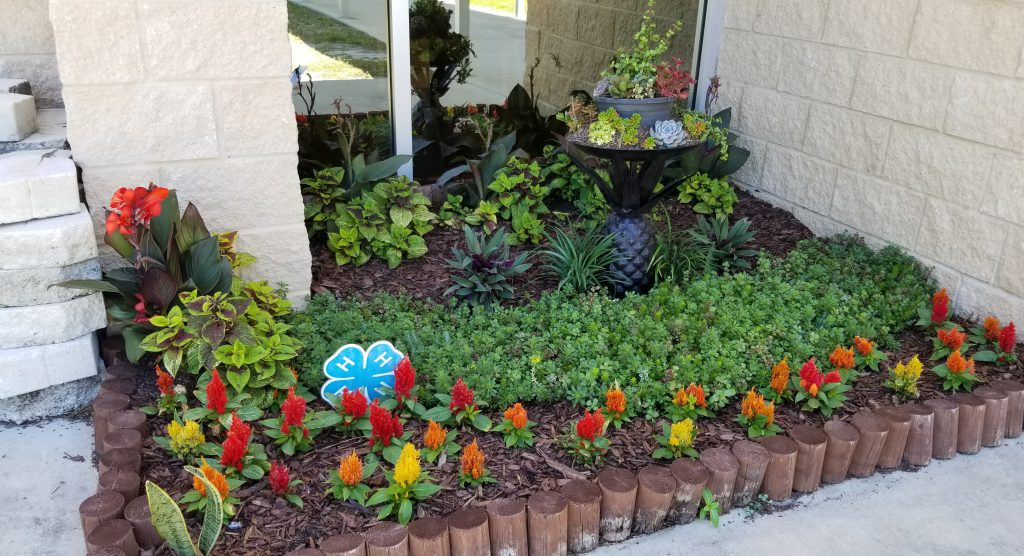
Succulent garden at entry of NSA-PC Youth Center
In September 2018, Ms. Bettina started the 4-H Garden Club at NSA-PC in Panama City, Florida. She had big plans for the garden and couldn’t wait to get started. These Navy youth, led by a caring adult staff member, started their 4-H journey. Then Hurricane Michael came, which devastated the area on October 10, 2018 and could have easily derailed all of their plans. Instead, the storm allowed youth to start with a clean slate and a renewed sense of vigor in rebuilding the garden at the NSA-PC Youth Center. The youth redesigned some of their beds using debris from the storm.
When the Youth Center reopened following the storm, most of the outdoor areas were off limits to the kids due to damage from the storm. That meant that the playground and other outdoor activities were not available. However, the 4-H Garden Club was allowed to function and allowed the youth itching to be outside and yearning for a way to cope with the devastating effects of Hurricane Michael to come together as a team and, along with Ms. Bettina, a garden to restore a sense of balance and ownership.
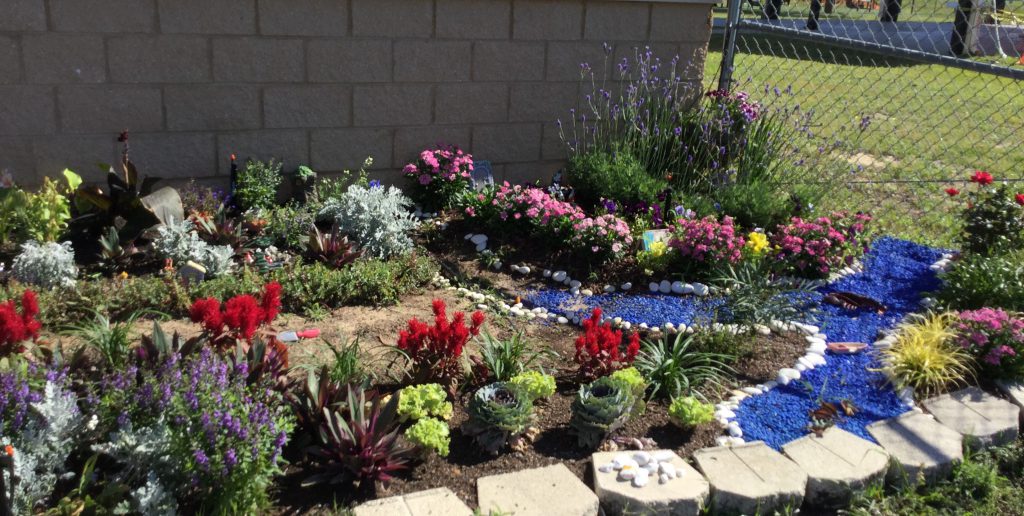
Whimsical garden bed designed by NSA-PC youth
The kids were eager to get started planning, implementing, and maintaining the new garden area. They created a plan for different types of gardens within their facility spaces. They researched which plants were best suited for the season and zone as well as which flowers would attract pollinators, because they hoped to see hummingbirds and butterflies. Ms. Bettina says that the kids came in every day asking if they were going to get to work in the garden. It created a healthy, active, and creative outlet for all involved. Soon the garden began to take shape with imaginative details and originality everywhere you looked.
All visitors to the Youth Center are welcomed by exquisitely maintained flower beds that surround the entrance to the building. The youth have created and maintained a beautiful area that enhances the building and greets visitors with beauty and color. These raised gardens are filled with hardy greenery as well as seasonal color and elevated containers that hold a cascade of many varieties of succulents.
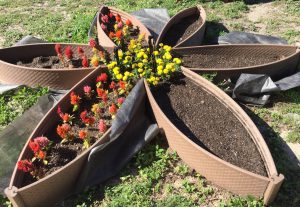
NSA-PC youth recycled old materials to create a new space to hold their flowers.
The 4-H Garden Club at NSA-PC is a perfect example of how sometimes a storm that seemingly derails plans actually presents an opportunity for growth, learning, and creating something more beautiful. Ms. Bettina’s 4-H Garden Club could not have come at a more perfect time. The gardening activities allow the youth to get outdoors while learning about different types of plants and how to care for them. Many students initially joined the Garden Club to get outside after the storm due to the playground closure. Youth participating in the 4-H Garden Club at NSA-PC have learned about more than just the science of plants; they are learning to work as a team with improved communication skills in order to continue maintaining their garden as well as environmental awareness and recycling by taking used items to make new treasures for their flower beds.
4-H is one of the nation’s most diverse organizations and includes people from all economic, racial, social, political, and geographic categories. There are no barriers to participation by any young person. Participants are given the opportunity to engage in activities that hold their personal interests while being guided by adult volunteers. If you would like to learn more about 4-H programming in your local area, or how to get involved as a 4-H volunteer, please contact your local UF IFAS County Extension Office, or visit http://florida4h.org.
RESOURCES
For more tips and ideas to help build your personal garden, visit http://edis.ifas.ufl.edu/ as there are many documents available to help build your personal gardens.
This article was written by Jennifer Sims and Paula Davis.
by Whitney Cherry | Mar 8, 2019
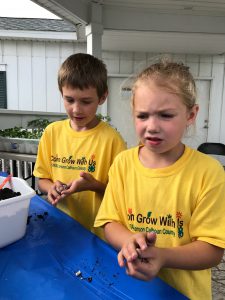
Wildflower seed bombs are a great indoor or outdoor project with unlimited potential for learning.
Wildflower seed bombs are the perfect project for kids itching to get outside. Even if you don’t have a green thumb or you don’t have outdoor space or the weather isn’t cooperating, you can make seed bombs that will help beautify roadsides, vacant areas and neighborhoods.
Give Them a Toss!
These little beauties don’t get their name from any explosive properties but from the fun you have “launching” them around your yard or neighborhood. As you toss them into places that aren’t frequently mowed, you beautify your neighborhood and provide an invaluable food sources for native Florida pollinators like bees, wasps, butterflies, and more.
Even though you may be more fond of some pollinators than others, there’s no doubt we need them all. Their pollination services are critical to fruit development in many of our fruiting crops. So if you like squash, cucumbers, melons, almonds and so much more, here’s what you can do to help:
Gather Your Materials
- Air-dry clay
- Wildflower seeds
- Potting Soil
Make Your Seed Bombs
- Pinch off a small amount of air-dry clay – enough to make a ball about the size of a bouncy ball or about 1″ diameter.
- Work equal parts seeds and soil into the clay and form it into a ball.
Amounts really are up to you. More seeds = more flowers.
But, too much soil will keep the ball from holding it’s shape. If this happens, add more clay and either have a bigger bomb, or divide it into two smaller bombs.
- Store them in a cool dry place and let them dry out completely in an air-tight container until you’re ready to spread some wildflower cheer.
- Now for the fun part! Toss them where you want flowers to grow.
Things to Consider…
- The air-dry clay acts as a binder only. It’s natural, non-toxic, and when wet, it will soften and allow the seeds to grow.
- Before storing in an airtight container, allow your seed bombs out to dry completely. Even a little moisture will allow the seeds to sprout.
- Be careful when throwing your seed bombs.
- Don’t hit people, animals, or other anything else with them – just the ground.
- Throw them where areas don’t get mowed very much. Some people throw them out along roadways or in abandoned lots. If these places are mowed regularly, they won’t last long if they even get to bloom.
- Get permission if you’re throwing them in public places.
Resources
Gardening is just one of the many Florida 4-H programs. To see what programs are available in your county, contact your local UF/IFAS Extension office, or contact your 4-H Agent about starting a gardening program in your county.
by pmdavis | Apr 29, 2016
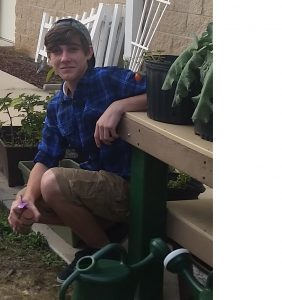 The month of April provides an opportunity to recognize and honor the service of our youngest heroes, military children. Since 1986, April has been designated Month of the Military Child. This allows us to acknowledge the significant role military youth play in our communities and honor them for their commitment and sacrifice. They are resilient and take pride in their service to our Country. They deserve our appreciation and support.
The month of April provides an opportunity to recognize and honor the service of our youngest heroes, military children. Since 1986, April has been designated Month of the Military Child. This allows us to acknowledge the significant role military youth play in our communities and honor them for their commitment and sacrifice. They are resilient and take pride in their service to our Country. They deserve our appreciation and support.
I am so excited to introduce you to one of our 4-H grown military youth, Michael. He began as a Bay County 4-H member as a summer camper three years ago. Michael then became involved with the 4-H club programs on base through the 4-H Torch Leadership Club. He serves as a peer mentor to other military youth in the base school age program. His work with younger youth includes helping them design, plant, and maintain a garden at their youth center. Assisting with homework and school struggles. Michael also participates in the 4-H Archery Program. In February, he was nominated as “Teen of the Month”. At camp this year, he is looking forward to serving as a counselor-in-training. Michael has adopted a quarterly service project using cooking skills he acquired from the 4-H foods and nutrition project to prepare and serve food to the single military members. He and his club are currently perfecting their entrepreneurial skills while working on a service project to support local veterans. He is also on the school track team. Michael is a phenomenal youth with a heart of gold and passion for helping others. He is a well-rounded young man that is very involved in 4-H. He exemplifies the 4 H’s – Head, Hands, Heart and Health. One of his club leaders, Ms. Heather said he really shows an interest in the younger youth and takes his role as a peer mentor seriously. She relayed a story of Michael taking extra time from his schedule to help a youth he was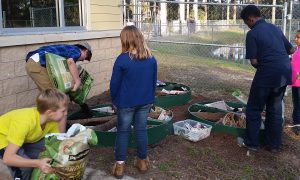 mentoring prepare for an upcoming test. His mentee was struggling to understand the material that was going to be tested on the next day, so extra time was needed reviewing the material.
mentoring prepare for an upcoming test. His mentee was struggling to understand the material that was going to be tested on the next day, so extra time was needed reviewing the material.
When I ask Michael what he felt he was getting out of being a 4-H member at the youth center and at camp, he responded “I feel that for the last few years since I have been in 4-H, I have become more outgoing, confident and experienced in so many ways. If not for 4-H, I might still be sitting in my room all day playing video games. I especially like helping others whenever I can whether it’s at the Youth Center or at Summer Camp. So to me, 4-H is an amazing program that has been a positive influence in my life and in 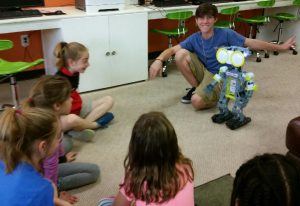 making me the person I am today.”
making me the person I am today.”
If you are a teen and want to learn more about how you can volunteer in your own county, please contact your local extension agent. Volunteering is a time investment that will pay you back exponentially through the growth you see in the youth and program you’re affiliated with. Volunteers come in all forms from peer mentors, camp counselors, to committee members. Follow the links below to see how you can help 4-H expand our capacity to reach more youth, more families, and more communities through utilizing your skills, your knowledge, and your story! #trueleaders #4hgrows
by Whitney Cherry | Apr 13, 2016
Jerry is a retiree and currently volunteers in the 4-H learning gardens in Calhoun County, working as he is available. He also answers my many gardening questions and offers advice. I’m grateful for his commitment to the Calhoun County 4-H program, and am glad to share his 4-H story with you today in his own words. Jerry says:
“I became involved in 4-H at age nine so that I could go to camp. My older sister and brother were going, and I didn’t want to be left out. At camp, I caught the 4-H “bug” and it has never let me go.
As a member of 4-H, I always found new and interesting challenges to do such as learning to swim at camp, collecting insects, growing a garden, raising and showing calves and pigs, farm judging at North Florida Fair, judging beef cattle at Tampa, Florida and dairy cows at Waterloo, Iowa, and attending 4-H Congress at Gainesville. All provided experiences and knowledge that were not available to me elsewhere.
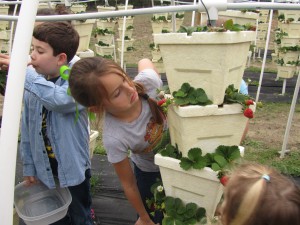
Youth enjoying the Calhoun County 4-H Learning Gardens which Mr. Wyrick helps to maintain.
Now in a volunteer capacity, I enjoy watching members grow and enjoy new and novel experiences which are available through 4-H Club programs and knowing that I am helping young people grow to be positive examples for their peers. “I continue to volunteer with 4-H because of the payback of having previous 4-H members relate to me what 4-H meant to them and how it helped them to achieve their personal accomplishments. If young people are expected to be positive influences on society, they must be provided examples and knowledge of meaningful lives. They must be exposed to new ideas and experiences so that they know choices are available to them. If the next generation is to be different – is to be a positive generation – they must be taught as young people. There are no better teaching methods than those available through 4-H Club programs.”
If you are not already a volunteer, think about sharing your talents with us! You can fuel the extraordinary efforts of our youth by joining us as a volunteer. To find out more, contact your local UF IFAS Extension Office or visit http://florida4h.org/volunteers. Happy National Volunteer Appreciation Week!












